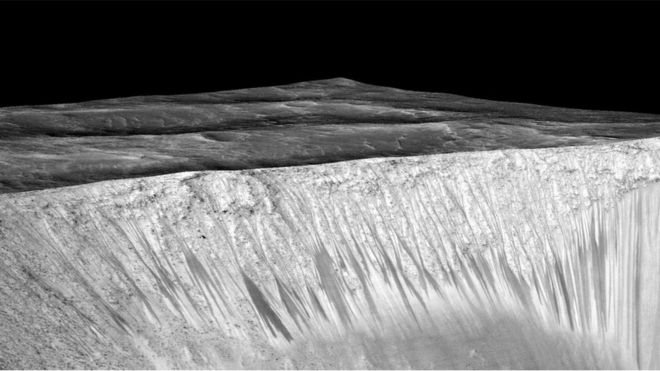But let's calm down. What exactly has NASA found? Well, NASA has been looking at the large slopes on the surface of the red planet and have noticed something interesting. Using the Mars Reconnaissance Orbiter, a satellite orbiting Mars, scientists have been studying these slopes and specifically looking at the chemicals present. What they've found is that in the summer months, long trails of salt appear, cascading down the slopes. The cause of this? Salt water trickling down the slopes, depositing the salt behind, before disappearing. The fact these only appear in the summer and disappear in the winter suggests Mars is warm enough in the Summer so that salt water can exist in liquid form. This is therefore evidence that liquid water does still exist on Mars!
 |
| Streaks of salt down the side of slopes on Mars are signs of water flow. |
But think back to your school days. Remember when your teacher told you Mars was beyond the orbit of Earth, beyond the goldilocks zone, where less of the Suns energy reaches the surface of the planet. Here, without a thick atmosphere like Earth, any water on Mars is frozen solid. We know this because we can see frozen water ice caps at the poles of Mars. So, how then has NASA found liquid water? Well, some months ago NASA found deposits of salt on Mars and this is the key to the freezing problem. Salt water, like in the oceans on Earth, has a lowest freezing point than pure water. This means whilst pure water on Mars is frozen solid, salt water will remain as a liquid.
We believe that Mars was once covered by a huge ocean of water, millions of year ago when it was warmer. This is far from the case today, but it now seems that at warm points on the planets surface, small trickles and steams of water exist on the surface.
So, if there is water on Mars, is there life? This is a tricky question. We know complex life doesn't exist on Mars (unless there's a colony of super animals living beneath the surface) (which there isn't), but simple life like bacteria is more possible. Whether they could live with such infrequent amounts of water is unknown. The harsh conditions on the surface, a mixture of radiation and extreme temperature, mean that even with a constant supply of water, life might still be impossible.
But this is a problem for another day, today is all about celebrating the discovery of liquid water on Mars. NASA and other space agencies have spent billions of pounds and dollars sending satellites and rovers to Mars, some designed specifically to find evidence of water or life on the red planet. And today all the hard work, by the thousands of NASA and space workers, has been a success. With several rovers still going and even more set to land on Mars in the future, there is still lot's of work to be done to understand this lone little red planet and find out whatever mysteries it still holds!
Want to find out more? Watch my latest YouTube video:
Want to find out more? Watch my latest YouTube video:


